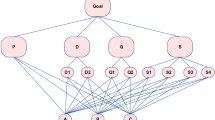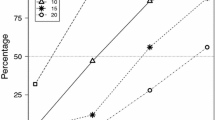Abstract
In several decision-making problems, alternatives should be ranked on the basis of paired comparisons between them. We present an axiomatic approach for the universal ranking problem with arbitrary preference intensities, incomplete and multiple comparisons. In particular, two basic properties—independence of irrelevant matches and self-consistency—are considered. It is revealed that there exists no ranking method satisfying both requirements at the same time. The impossibility result holds under various restrictions on the set of ranking problems, however, it does not emerge in the case of round-robin tournaments. An interesting and more general possibility result is obtained by restricting the domain of independence of irrelevant matches through the concept of macrovertex.




Similar content being viewed by others
Notes
IIM is the abbreviation of independence of irrelevant matches, an axiom to be discussed in Sect. 3.1.
While \(m_{ij} \in \{ 0; 1 \}\) for all \(X_i,X_j \in N\) allows for \(m=0\), it leads to a meaningless ranking problem without any comparison.
Some of their differences are highlighted by González-Díaz et al. (2014).
References
Altman A, Tennenholtz M (2008) Axiomatic foundations for ranking systems. J Artif Intell Res 31(1):473–495
Bouyssou D (1992) Ranking methods based on valued preference relations: a characterization of the net flow method. Eur J Oper Res 60(1):61–67
Bozóki S, Csató L, Temesi J (2016) An application of incomplete pairwise comparison matrices for ranking top tennis players. Eur J Oper Res 248(1):211–218
Bozóki S, Fülöp J, Rónyai L (2010) On optimal completion of incomplete pairwise comparison matrices. Math Comput Modell 52(1–2):318–333
Chao X, Kou G, Li T, Peng Y (2018) Jie Ke versus AlphaGo: a ranking approach using decision making method for large-scale data with incomplete information. Eur J Oper Res 265(1):239–247
Chebotarev P (1989) Generalization of the row sum method for incomplete paired comparisons. Autom Remote Control 50(8):1103–1113
Chebotarev P (1994) Aggregation of preferences by the generalized row sum method. Math Soc Sci 27(3):293–320
Chebotarev P, Shamis E (1997) Constructing an objective function for aggregating incomplete preferences. In: Tangian A, Gruber J (eds) Constructing scalar-valued objective functions, vol 453. Lecture notes in economics and mathematical systems. Berlin, Springer, pp 100–124
Chebotarev P, Shamis E (1998) Characterizations of scoring methods for preference aggregation. Ann Oper Res 80:299–332
Chebotarev P, Shamis E (1999) Preference fusion when the number of alternatives exceeds two: indirect scoring procedures. J Frankl Inst 336(2):205–226
Csató L (2013) Ranking by pairwise comparisons for Swiss-system tournaments. Central Eur J Oper Res 21(4):783–803
Csató L (2015) A graph interpretation of the least squares ranking method. Soc Choice Welfare 44(1):51–69
Csató L (2017) On the ranking of a Swiss system chess team tournament. Ann Oper Res 254(1–2):17–36
Csató L (2018a) Some impossibilities of ranking in generalized tournaments. Manuscript. arXiv 1701:06539
Csató L (2018b) Was Zidane honest or well-informed? How UEFA barely avoided a serious scandal. Econ Bull 38(1):152–158
González-Díaz J, Hendrickx R, Lohmann E (2014) Paired comparisons analysis: an axiomatic approach to ranking methods. Soc Choice Welfare 42(1):139–169
Hansson B, Sahlquist H (1976) A proof technique for social choice with variable electorate. J Econ Theory 13(2):193–200
Henriet D (1985) The Copeland choice function: an axiomatic characterization. Soc Choice Welfare 2(1):49–63
Horst P (1932) A method for determining the absolute affective value of a series of stimulus situations. J Edu Psychol 23(6):418–440
Kaiser HF, Serlin RC (1978) Contributions to the method of paired comparisons. Appl Psychol Meas 2(3):423–432
Landau E (1895) Zur relativen Wertbemessung der Turnierresultate. Deutsches Wochenschach 11:366–369
Landau E (1914) Über Preisverteilung bei Spielturnieren. Z r Math Phys 63:192–202
Nitzan S, Rubinstein A (1981) A further characterization of Borda ranking method. Public Choice 36(1):153–158
Radicchi F (2011) Who is the best player ever? A complex network analysis of the history of professional tennis. PloS ONE 6(2):e17249
Rubinstein A (1980) Ranking the participants in a tournament. SIAM J Appl Math 38(1):108–111
Thurstone LL (1927) A law of comparative judgment. Psychol Rev 34(4):273–286
Young HP (1974) An axiomatization of Borda’s rule. J Econ Theory 9(1):43–52
Zermelo E (1929) Die Berechnung der Turnier-Ergebnisse als ein Maximumproblem der Wahrscheinlichkeitsrechnung. Math Z 29:436–460
Acknowledgements
We thank Sándor Bozóki for useful advice. Anonymous reviewers provided valuable comments and suggestions on earlier drafts. The research was supported by OTKA grant K 111797 and by the MTA Premium Post Doctorate Research Program.
Author information
Authors and Affiliations
Corresponding author
Rights and permissions
About this article
Cite this article
Csató, L. An impossibility theorem for paired comparisons. Cent Eur J Oper Res 27, 497–514 (2019). https://doi.org/10.1007/s10100-018-0572-5
Published:
Issue Date:
DOI: https://doi.org/10.1007/s10100-018-0572-5




